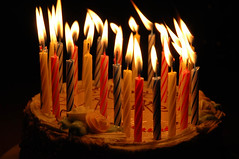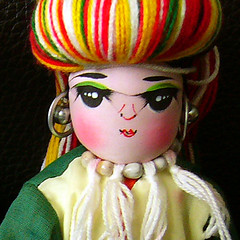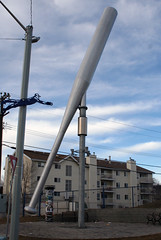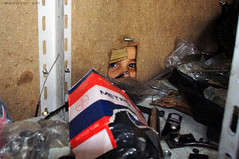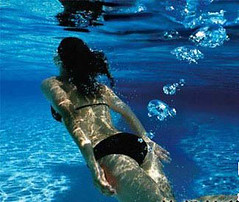skip to main |
skip to sidebar
I end up very often into situations where my age pops up. It goes from "in your age" to "when you are my age" all the way up to "are you really that old". I guess my work somewhat explains this. At the same time I work a lot with teenagers and also speak often about youth in events where the entire audience is significantly older than I am.
During the years I have developed a toolbox filled with witty remarks for occasions where I am branded as the voice of the young people. The most powerful ones seem to be the ones referring to approaching thirty and what my parents had already in my age. Good counterpunch is also to start talking about the middle-aged - this usually irritates the same people who only a split second later have made critical and cynical remarks on today's youth.
The most irritating thing for me is when my views are dissed with the following remark:"Tommi, you will understand in twenty years." Another that makes me go up the wall is the following:"That's how the world seemed like also to me when I was your age but when you get a little more experience, you will also understand that things are not that simple."
For a long time I just grunted and kept on going. Nowadays I usually show genuine irritation. This does not need to be tolerated.
"I don't care if there are years between us but I am usually able to understand positions of others. Please explain to me what is the difference between mine and your perception", was my comment lately in a work situation.
I am once again in London for my work. I still have to adjust my brain to the fact that this city is really really big. Was running embarrassingly late from every single meeting today. But at least day started with the Londoner acrobacy, i.e. handling the public transport ticket, cup of hot coffee, bag, jacket and a newspaper when running to the Underground.
The most shocking news of today came in a meeting with the BBC. I asked my contact person what other projects she is working on. She told me that there is a big literacy project that she is responsible for. "Oh, is that a big problem then", I innocently asked. "Well, i would say so. In the age group 25-55 we have 12 million people who are illiterate."
I still cannot understand that. In Finland we do not have top of the class universities but everyone can read. In one of the wealthiest countries in the world you have TWELVE MILLION people who cannot read properly. I find it shocking, just shocking. Have to digest this a bit. How on earth is that possible? What and when went so wrong? And what does it do to your democracy?
I just got back from the Prix Europa, an annual festival for best European television and radio held in Berlin. More than the programmes I saw, two remarks from the last evening stuck into my head.
"I mean I cannot believe the difference between this discussion about multiculturalism and the British discussion. During the last week people have been asking me where do I come from. When I answer London, they ask where do I really come from. When I say that I was born in London, they start talking about my blood. I mean in the UK if you would start talking about blood, you would face the risk of being smacked!
I told one of the people executing this inquiry that my parents come from India. He said to me that I don't look Indian. What am I supposed to say to that!"
- A British TV professional
"In Finland the discussion goes like this.
Question number 1: Where do you come from?
Question number 2: What are you doing here?
Question number 3: Why do you speak so good Finnish?
I must say that I could live with the first two but the third one makes me really angry!"
- A TV professional living in Finland
A working group has just published a proposal for a new creativity strategy for Finland. The report was commissioned by the Minister of Culture. I read it through with a high level of confusion. I would so much like to support its direction but find this to be somewhat difficult. I will elaborate why.
I did my Master’s thesis on the information society policy of the current Finnish cabinet. In my thesis I analysed the reasoning for the investments and the position of the citizen in the implementation process. It feels somehow disappointing to see exactly the same problems in the creativity strategy as I pointed out in the conclusions of my thesis. I am starting to be quite convinced that Finland has a big issue to solve in the relationship between the state and the citizens. The policy documents of the Finnish government put the citizen over and over again into a passive role. The belief in the power of the state is enormous. Even though the report talks about the responsibility of parents and individuals, the approach follows the lines of the information society policy: the government strengthens certain qualities in individuals.
If the citizen approach would be the only problem in the creativity strategy, I could avoid falling into despair. However, the bigger issue is the traditional Finnish view on the world. The national identity still starts from the notion that Finland lives in its own universe – a world with fixed borders and national structures. A world where we interact with the rest of the world but are not part of it.
A look into the composition of the working group gives us more tools for understanding the tone and approach. It consists mostly of people who have worked their entire life in Finnish national stuctures. The working group was led by Mr Esko Aho, the Prime Minister during the severe economic recession of the 1990s. Only two members of the working group come from the cultural sector. Twelve out of the twenty-one members are civil servants – most from ministries. Most of them have sat in half a dozen of these committees during the last ten years. Only eight of the twenty-one members are women. Nokia is of course represented.
This may not come as a surprise but not a single member is under the age of fourty. And this shows. I don’t think most of my generation would start a document with the following sentence:”The Finnish society is economically and socially stronger than ever.” This makes most of the document useless. I remember Aho himself saying in a seminar in 2004 that only the atmosphere of a crisis made it possible to make the difficult decisions in the 1990s. The working group does not seem to follow the strategy once outlined once by its Chair. By painting a rosy picture, they dissolve all the ground for brave actions. Most of the eleven recommendations are about increasing, widening or strengthening.
A relaxed translation of what is proposed:
1. Fostering children’s creativity – stressing the responsibility of parents
2. Complete school day – innovative combinations of leisure and educational activities, more skills and arts in schools
3. Cultural policy integrated more to other policy areas, widened funding basis (corporate) and new funding methods for culture
4. Increased efforts into debating and discussion skills, bigger commitment in international cooperation and intercultural dialogue
5. Creativity playing a bigger role in urban planning
6. Experiments and research on the links between working conditions and creativity
7. Management of creativity a priority, new ways for cycling jobs
8. Creativity a component in regional and business funding structures and support actions
9. Entrepeneurship more integrated in education, closer links between educational institutions and companies
10. More flexible public administrations, new ways of working with NGOs
11. Policy programme on creativity for the next cabinet led by the Ministry of Education
All and all the working group favours polishing and adjusting to suggesting something actually different. And as the document outlines, the creativity in Finland should benefit the individuals, their communities and the Finnish society. Global solidarity is not in.
I saw on Monday the hilarious film Devil Wears Prada, where Meryl Streep does a magnificently vicious role as the bitchy Editor in Chief Miranda Priestly. The creativity committee’s approach is very much in line with how Ms Priestly justifies her actions:”Don’t be silly. Everyone would want to live this life.” Even after Aho’s committee, Finland still has work to do in shaking off the image of being the wonderboy of the class.
I took some lessons in management studies during my time at university. On the course on negotiation skills they stressed the importance of trying to build a common ground if you are about to suggest tough measures. I also remember from my studies on rhetorics that if you wish to persuade someone to join your side, you should stress the similarities.
Well, it seems clear that a lot of French politicians did not attend the same lessons. Today's decision to introduce a law banning the rejection of the Armenian massacre is a scary and irresponsible example of how another country in a delicate position is used as a tool for domestic politics. Without victimising Turkey, it also shows how difficult the so-called European project is especially when national politicians escape responsibility for difficult European decisions. I have a terrible feeling that once again someone innocent gets killed for something someone said and the bullshitty notion of a clash of civilisations gets more supporters.
We organised a few weeks back a journalistic conference in Istanbul and a lot of people commented afterwards that even if they only saw the Golden Horn and the European side of Istanbul, their view on Turkey is now far more multi-dimensional. At the same time my parents were for the first time in Turkey and told me that they loved it and their view on the country changed tremendously. I recognise that there are problems and a substantial need for progress but I fear that these kind of incidents are once again used for strengthening the idea that the entire country lives in a parallel universe to ours.
I am disappointed in the lack of responsibility and leadership. I feel bad for my friends in Turkey. It makes me angry how spineless opportunists succeed and how little most leaders trust the judgement of their people. What should one do? I am quite sure that legislating opinions is not the right way. It definitely does not encourage change for the better. Especially if it is on something in another country.
I felt my temperature rising already on Monday evening. I was about to fall asleep at work, my eyes were drying out and every muscle in my body ached. On Tuesday morning it was obvious. During the night I had gone from shivering to sweating, back to shivering and then sweating again. Well, this happens every year and the signs were in the air. Most of my colleagues had called in sick during the last few weeks and I had been working six days during the previous week instead of the normal four (yes, I can hear the cry all the way from Finland: did he just say four?!) So I called the office on Tuesday morning and told them that it maybe better to drink my tea at home today.
One of the best things in being ill as a child was that especially my grandmother (from my father's side) had all these recommendations of what one should do. The most important thing that I can remember was to drink a lot of Jaffa (orange limonade). I also recall that I was allowed to eat everything nice. A few years ago after a throat surgery I had a grandmother-linked dejavu when the doctor told me that the only thing I could eat during that day was ice cream. Now how cool is that (pun intended)?
So yesterday's programme was set from the start. I started the day watching trailers of new films from iTunes, went through the films of my flatmate (so saw "masterpieces" like In Her Shoes and Sliding Doors) and slept in the middle of the day. Between all this I cycled to the supermarket, put on my "I am ill so I am allowed to buy this stuff" face and bought all these fancy juices and croissants and what have you, came home and chunked them down my throat. Lek-kerr.
Sometimes I wonder whether an adult needs to get ill to do this.
To finalise, a small remark on bakeries: I really see now the difference between this and the previous neighbourhood. At the Zeedijk the bars started filling up as I cycled home. In De Baarsjes, the Balkan bakery, the cornershop or the Turkish restaurant are the places to be.
I had coffee this afternoon with a friend of mine in an idyllic cafe by a canal. We were talking about the power of politics and what one should do to make the world a bit better. Yes, seriously, this was the discussion. I told him that it is important for me to feel that I am making a difference and getting something done. This builds up a lot of frustration but it also boosts you to go a bit further. This weekend I got three reminders of why the world still needs some work.
1. Revealing the truth is still dangerous as the murder of Russian journalist Anna Politkovskaja reminds us. Very often people tend to have the impression that journalists are people who pass the line to parties and receive free CDs and T-shirt on a daily basis. Politkovskaja wanted to show the other side of Putin's Russia and lived constantly under death threats. One can only admire her courage and relentless pursuit for the truth.
2. People want to be involved. I was this weekend in Brussels for the launch of European Citizens' Consultations, an initiative of the Commission and several foundations to hear what Europeans think Europe should do. For the launch the organisers had invited randomly selected eight people per member state to set the agenda. With the help of simultaneous interpretation people were given the chance to express themselves in their own language. It was motivating to see that people have something to say although I was somewhat concerned for the amount of protectionism and xenophobia.
3. The level of civilisation is measured by the way the state takes care of the very weakest. I could not help crying today when I read an article of the mental problems of asylum seeker children in the Netherlands. Most children who wait with their families for an asylum, suffer from apathy, depression, hyperactivity and suicidal tendencies. An investigation is carried out whether the Netherlands is violating the International Declaration for Children's Rights. The teenagers interviewed in the article do not see a change for the better in their future. The Minister of Integration says that the asylum seekers are strongly personally responsible for their situation as they refuse to go back.
I worked earlier this year with asylum seeker teenagers in a video project. These youngsters were the nicest, the most clever and the smartest young people I have come across in the last few years. And at the same time the thing called the welfare state is showing clearly to them and their families that they have no right for dignity or for a better future. Let me remind you that only a year ago 11 asylum seekers died in a fire at the Schiphol airport detention centre due to lack of proper safety equipment. This all happens in a country that has still the reputation of a tolerant and caring welfare state.
I was in a seminar today on communities in the cultural sector. I watched a DVD yesterday. I had dinner tonight. Some results:
"The French integration is based on the notion that the principles of the French constitution are universal."
"Interculturalism means funding for projects where different cultures contaminate each other."
"Peace and tolerance are issues that are difficult to make into something edgy and interesting. Like who would say that they are against peace?"
"There is a common perception that arts for and by immigrants means folklore or amateur."
"Depression is America's greatest export product."
"This is a time of fast food but slow digestion. A time of tall men but short characters."
"Some bloody guys crushed our dreams of Europe in Sarajevo with a few shots."
"Most rock musicians in Carelia are sons and daughters of Finnish communists."
"Let's talk about children. Children are a bit like farts. Everyone kind of likes their own."
"In integration we have ended up into a situation where priests and racial relations specialists are running the show."
"If a country would be a company and I would really like to develop our systems and products and one department would object completely, I would know what to do."
"You Europeans are funny in one way. We Americans dare to ask the stupid questions and to be ignorant and ask the things everyone wants to know. You are so bloody scared of making a mistake."
Yes, I know it is not English. It is this language they speak here and it means...uhm, the word does not really exist in English...I guess....like the act of becoming a citizen. Once again a funky proof of the link between language and culture. I mean in which other language you have so many distinctions in this field of life. Just take the word allochtoon which sort of means a person who has at least one of his/her parents or himself/herself with a non-Dutch bloodline. Yep. That's a distinction one needs daily.
I don't know how I got there. This was supposed to be a joyful memorabilia of experiences this weekend. I have made once again big leaps in getting settled in Amsterdam.
I made friends with the owner of the nearby second-hand furniture shop who delivered my table and chairs last Saturday. He knows my name and I know his. I loved the moment when he declared his love to these 60s things and promised to give me a call when they get more. I felt like I had just passed an initiation ritual of an exclusive club.
That together with a dinner with lovely people during a thunderstom at my friend's apartment, getting to know my local Turkish shopkeeper, doing business with the guy who runs the bakery on the other side of the bridge and speaking Dutch with the nice woman who is going to fix my jeans - yes - Amsterdam is just a village. And I am loving it. Or I am just turning 30.
